The 10th July public sector strike was the largest since the pensions dispute in November 2011. The size of the strike should now be used as a launch pad for a clear labour movement led campaign of escalating action to bring down the government and end austerity. We publish here reports from Socialist Appeal supporters across the country.
Yesterday’s strike was the largest since the pensions dispute in November 2011. We have therefore had, in the past three years, two of the largest strikes in British history. These largest of labour movement mobilisations cannot be allowed to go to waste. On July 10th millions of workers, who have seen their living standards and terms and conditions attacked on a truly unprecedented scale, came out in a marvellous display of coordinated action.
One could see banners from more unions than we have ever seen taking joint action before. Yesterday the British working class demonstrated in practice what Marx explained more than a hundred years ago: the working class forms an overwhelming social force of united action and solidarity.
The size of the strike should now be used as a launch pad for a clear labour movement led campaign of escalating action to bring down the government and end austerity. The truth is such a campaign should have been launched after the successful strike in November 2011, but the union leaders have been dragging their feet, taking three years to organise another coordinated strike against austerity.
The question on everyone’s lips yesterday was – what next? Unfortunately the answer to this question coming from the trade union leadership has been somewhat vague.
For us, yesterday’s turnout – which was reportedly higher than had been expected – makes things clear. The trade union leadership must argue consistently that the reason for the cuts is not one of ideology, but of cold hard cash – capitalism is passing through an historic crisis, and all governments based on capitalism will impose harsh austerity.
The fight must be fought with that understanding. The next step should be the mobilisation of a one day general strike to bring together the whole class. But this should from the start be accompanied with the articulation of clear strategy for victory – that is, of the plan to coordinate and escalate action beyond one day strikes, accompanied with a concerted fight for a socialist programme to replace capitalism in the entire labour movement.
Up and down the country there were thousands upon thousands of picket lines and mass rallies in town centres. Below are a few reports of Socialist Appeal’s participation in these and our reflections on the mood of the workers.
Newcastle and Gateshead
Socialist Appeal supporters in the North East were on the picket lines from 6.45am, with a presence at North Tyneside, Northumberland and Gateshead. By all accounts only a handful of scabs crossed the picket line, although the position was made complicated by virtue of non NUT teachers and outsourced workers being asked to report to Civic Centres.
In many local authorities Housing Services have been put out to Arms Length Management Organisations and in some cases these weren’t balloted. Yet in Gateshead only a small minority of staff from Gateshead Housing Company went into work. The majority voted with their feet. This illustrates the mood under the surface that the union should be tapping into. Noticeably many workers have signed up to the union over the last few days and several new stewards and activists were on the picket lines.
Some 40 UNISON and GMB pickets covered the gates at Gateshead Civic centre, with a great response from passers-by. A delegation from Tyneside Safety Glass who have been involved in a bitter strike attended the picket line to reciprocate the solidarity the union branch has given to their dispute.
Comrades in Gateshead are well known in the local branch and took a lead in the picketing at the Civic. In North Tyneside and Northumberland we played an important role in discussing with people on the picket lines and those trying to cross them.
A regional rally followed in Newcastle with an excellent turn out from all the unions involved in the dispute. Some 1,500 workers attended with FBU members very much in evidence. The mood was quite different to the Pensions dispute in November 2011, partly because the campaign within UNISON at least was much less visible.
The strike day reflects the anger among members about low pay and austerity. It ought to be a wakeup call to the union leadership that the potential is there to fight for the full claim. But that will require concentrated pressure from the members. The Marxists have a major part to play in this.
Portsmouth
10 July 2014, saw the largest demonstration against the Government and campaign for a pay rise since November 2011. Up to 600 workers and their families gathered in Guild Hall square to hear speakers and to join a short march around the shopping area. Back at the rally there were speeches from representatives of the Unions involved, Unison, Unite Community, FBU, PCS and the NUT. The regional organiser from the RMT expressed solidarity. The main theme of the speeches was the good turnout and calls to build, especially from UNISON, for a two day strike in September (9th & 10th).
Reports were received of the magnificent response to the call for the strikes. The 2 local offices of Revenue and Customs had over 85% of their members staying away from work. PCS members in the Portsmouth dockyard had joined the strike.
Local schools were closed, although many would stay open because other teachers’ Unions had not been called out. Local Council Offices in Portsmouth and Havant were picketed.
The local Unite stewards had been picketing the Portsmouth Ferry Port from midnight, with leaflets in both French and Spanish. The response exceeded their expectations as the workers and lorry drivers walked out.
Strikers from the FBU were greeted loudly as they explained their ongoing dispute and cuts in Pensions and conditions.
Sue Castillon, Prospective Labour Candidate for Portsmouth South valiantly supported the strikes, unlike the leadership of the party, and explained future Labour policy. After the attacks made on the Labour Leadership from other speakers there was polite applause to her speech.
The marchers and the demonstration were met with support and curiosity (how since the news and papers were full of attacks against the strikes is a mystery!), but in general there was little, if any hostility.
Bristol
It couldn’t have been a nicer day for a strike, demo, and march with the sun shining and a holiday feeling about it all. Bristol Marxists come from many different areas and we all went to our nearest demo. College Green in the centre of Bristol gradually filled up, mostly with people(photot att) but some stalls and a PA system with a few speakers, and of course Channel 4 News.
One young firefighter was telling us about how the pension arrangements are going to affect him and his family. He joined the Fire Brigade when he was 20 with a promise that he would be able to retire at the age of fifty on a good pension. Not unreasonable for a worker who spends much of his working life fighting fires and helping people escape from life threatening situations. He pays nearly £400 per month into his pension scheme and the government is now assuming that they will be as fit at 60 yrs of age as they were at 20. Even the courts say that the age of 55 for a fire fighter should be the maximum. They are assessed every 3 years on their medical fitness, and if they fail or get injured in their work they will no longer be able to get a medical discharge which would have meant they get their pension straight away. They will now get dismissed, if another job cannot be found and their pension frozen. This brave young worker doesn’t think that many will be fit enough physically or mentally after such a gruelling life to carry on till 60 yrs of age and the aim of the government to to set them up to fail, so that they do not have to pay any pensions out. Under their proposals firefighters in their 50s would face dismissal – simply for getting older.
At 11.30am those gathered on the green – 1500 or so – marched through the town accompanied by a band at the front, the Red Notes protest choir in the middle and a lone drummer at the end, with supporting car horns on the way.
Barnsley
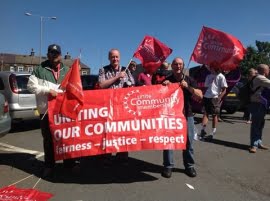 Public Service workers came out in force in Barnsley against the never ending cuts in jobs, wages and services imposed on the long suffering people of Barnsley. Unite Community members joined the picket lines at the Gateway Plaza to support Local Government Workers in Unison and the GMB. Later the workers were joined by striking members of the FBU, NUT and other unions for a march around the streets of Barnsley Town Centre, ending with a rally.
Public Service workers came out in force in Barnsley against the never ending cuts in jobs, wages and services imposed on the long suffering people of Barnsley. Unite Community members joined the picket lines at the Gateway Plaza to support Local Government Workers in Unison and the GMB. Later the workers were joined by striking members of the FBU, NUT and other unions for a march around the streets of Barnsley Town Centre, ending with a rally.
The public received the events enthusiastically with rounds of applause with many joining in the march. With the 30th anniversary of the Miners’ Strike being remembered and celebrated over the summer months, the mood here in Barnsley is one of total defiance to the cuts and of the Coalition Government. Needless to say Tories are few and far between in this staunch deeply red heartland of the Labour and Trade Union movement.
Ricky Vivian, Unite the Union
Sheffield
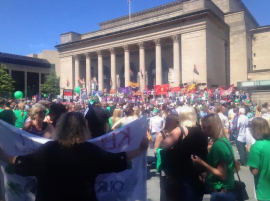 The joint strike action in Sheffield received a sizeable turnout despite a mixed reaction towards the industrial action on the picket lines from strikers. Supporters of Socialist Appeal in Sheffield roamed from picket to picket speaking to a variety of union members concerning their opinions regarding the use of one day strikes and their reactions to the attacks on their working conditions as a result of the austerity measures imposed by the Tory government.
The joint strike action in Sheffield received a sizeable turnout despite a mixed reaction towards the industrial action on the picket lines from strikers. Supporters of Socialist Appeal in Sheffield roamed from picket to picket speaking to a variety of union members concerning their opinions regarding the use of one day strikes and their reactions to the attacks on their working conditions as a result of the austerity measures imposed by the Tory government.
Some workers on picket lines held a fairly ambivalent attitude towards the prospective success of their industrial action as a measure to combat pay freezes and job losses within their workplaces. Two Unison members voted against industrial action yet still felt compelled to be present on the picket line. Their reluctance to strike was characterised not by hostility to striking per se but by a lack of confidence in their ability to win concessions from employers through one day strikes. One striker noted her doubts about participating in single day strikes was a consequence of perceiving them to be minor and ineffective when not linked up with the wider movement and a plan of escalation. She also suggested that such small scale strike action was demoralising for strikers.
There is a clear link between the lack of confidence held by workers in their ability to win concessions through the small scale strike action proposed by the unions, and the union leadership’s lack of confidence in both its members and its own strength. What is clearly needed is a bold leadership that is prepared to look toward escalating industrial action in order to properly represent and fight for an increasingly antagonised workforce. Prolonged attacks to working conditions, coupled with a succession of small scale public and private sector strikes resulting in little or no gains (such as the recent UCU dispute which capitulated at only a 2% pay increase) have led members to feel disillusioned with the unions.
Despondency wasn’t the majority mood today however. The general feeling on the rally that marched through Sheffield city centre was much more optimistic. John Stevenson, a GMB member, reflected this statement in an interview with Socialist Appeal members stating: ‘If I didn’t think we could win, what would be the point in being here in the first place?’ Furthermore, many strikers identified themselves as those who would not ordinarily take to picket lines but had been forced to due to working conditions. Despite the so-called ‘recovery,’ public sector workers are facing yet more cuts. John added, ‘jobs are being decimated, pay is being decimated, there comes a point when people have to say- enough is enough.’
Clearly rank and file members understand that there is a fight to be fought over pay, pensions and working conditions in general and that ‘enough is enough’, as John said. For many strikers that we spoke today, further cuts are simply not an option and they are taking industrial action as a last resort – action that many feel they can win.
Today’s strike, if nothing else, shows the willingness of workers to stand up and resist cuts and austerity despite the continued attacks to working conditions and the lack of fight from union leaders. What the working class needs now is a leadership that is prepared to escalate industrial action and link together individual struggles across to the national and international levels more generally. The militant mood of the workers must be galvanised and linked with bold socialist policies that demand the nationalisation of the commanding heights of the economy under workers’ control. This is the only alternative to solve the ensuing austerity attacks to working conditions that result from the global crisis of capitalism. For bold union leadership! For an end to austerity! For socialism!
Manchester
The rally in Manchester was attended by a few hundred people, and the mood was very positive. Among the workers and union members we spoke too, there was no real feeling of apathy or disillusionment. On the contrary, everyone we spoke too showed optimism, militancy, and above all a determination to continue the struggle and build for more strike action after today, as it was recognised that an isolated strike will in itself solve nothing.
One GMB member we spoke to actually pointed out his boss, who was driving past the rally in order to intimidate the union members into returning to work, perfectly demonstrating the fierce determination of the bosses and the ruling class to oppose and crush the strike, and any collective action from the working class. He also lamented the attitude of some scabs at his workplace, correctly pointing out that losing one day’s pay is nothing compared to the misery and suffering that will inevitably happen if workers do not resist the wave of economic cuts, privatisation, and worsening conditions. At this point I also mentioned Grangemouth and the strikebreakers of 1984-1985, and the consequences of such capitulation by the working class.
Our call for the nationalisation of the commanding heights of the economy under worker’s control was very well received. Most people also agreed with our analysis on the weakness of the union and Labour Party leaderships.
Leicester
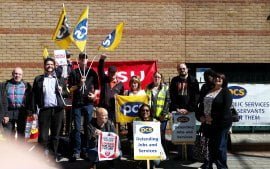 Four comrades were available on the day, from the PCS Leicestershire Revenue & Customs Branch, after four hours picketing the comrades attended the united union march & rally. About 1500 angry and determined strikers marched for pay, in HMRC the offer is 0.5%. All 6 unions were represented including a sizeable section from the Leicestershire FBU Branch who were participating in local activities for the first time – as a Rep reported “This is all new to us – we always had excellent relations with management so have never needed to be militant – the attack on our pensions and the news that we will be losing a 5th of our budget and therefore jobs has chucked that out the window”. The lively demonstration was met with applause as it wound its way to the Town Hall Square for the rally.
Four comrades were available on the day, from the PCS Leicestershire Revenue & Customs Branch, after four hours picketing the comrades attended the united union march & rally. About 1500 angry and determined strikers marched for pay, in HMRC the offer is 0.5%. All 6 unions were represented including a sizeable section from the Leicestershire FBU Branch who were participating in local activities for the first time – as a Rep reported “This is all new to us – we always had excellent relations with management so have never needed to be militant – the attack on our pensions and the news that we will be losing a 5th of our budget and therefore jobs has chucked that out the window”. The lively demonstration was met with applause as it wound its way to the Town Hall Square for the rally.
Overall a brilliant day – but we know it is just a start if workers are to resist the attacks raining down on them from capitalism. For a one day general strike!
On a funny note an angry lady approached our picket line – at first we thought she was ranting about our public service greed but it became apparent that she wasn’t angry with us and demanded of the pickets “Why en I out with yu, can you explain why?” answering her own question she said “I’m a nurse and my lot (she meant the union leadership) ent got the balls” We said “Maybe next time?” she smiled and said “oh yes!” as she walked away raising a clenched fist and waiving it until she disappeared round a corner.
Cambridge
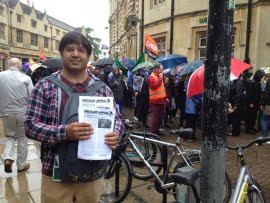 Trade unions involved in the strike in Cambridge were mainly FBU, GMB, PCS, NUT, Unison and Unite plus some activist groups. Cambridge Socialist Appeal were present supporting the strike throughout the day.
Trade unions involved in the strike in Cambridge were mainly FBU, GMB, PCS, NUT, Unison and Unite plus some activist groups. Cambridge Socialist Appeal were present supporting the strike throughout the day.
People were asked to gather at 10am in Parker’s Piece (a large park in Cambridge Centre). Despite heavy rain, there was a huge number of people at Parker’s Piece. The march towards the city centre started at 11am and returned to the same place at midday for a rally. During the rally, speeches were made and by trade union representatives. I managed to get on the mic and address the crowd briefly, arguing that we should use the current strike as an opportunity to create a mass movement of the working class to bring down the Tory government, and that the next Labour government – if in power – should adopt socialist policies and defend the interests of the working class.
People applauded our analysis, especially on the question of the need for a fighting trade union leadership armed with socialist policies. Later we interviewed two people, one was a teacher who was also a trade union member and the other one was a Labour party candidate. The teacher explained the effects of the wage freeze, working condition and stresses at work in schools. The Labour parliamentary candidate was strongly criticising the Tories but then offered no alternative.
Overall, despite the rain, the strike appeared strong and the rally well attended. The anger and desire for more serious action was apparent from those on strike.
Peterborough
Peterborough Trades Union Council organised support for picket lines and a march that saw over a hundred people parade into the centre of the city for a rally where speakers from UNITE, PCS, UNISON, NUT and the Labour Party called for fair pay, living pensions, and the living wage.
London
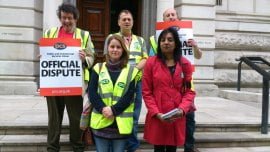 I attended a picket line at Kings College in London which is having its own strike against the outrageous plan to cut 120 jobs in order to fund speculative investments. Interestingly the picket line saw trade unionists from other universities, such as SOAS and UCL, in attendance in solidarity, as well as some students, which is impressive considering the university students are now on holiday.
I attended a picket line at Kings College in London which is having its own strike against the outrageous plan to cut 120 jobs in order to fund speculative investments. Interestingly the picket line saw trade unionists from other universities, such as SOAS and UCL, in attendance in solidarity, as well as some students, which is impressive considering the university students are now on holiday.
We then attended the main London strike rally which assembled outside Broadcasting House and marched to Trafalgar Square. In spite of the poor weather, the mood at the assembly point was extremely lively, noisy and confident. The presence of the FBU with their T Shirts and strike bus was particularly good.
When I spoke to FBU members on strike, they were strongly in support of the strike but felt unsure of where it was headed after today. They felt there was a need for more coordinated strike actions as seen today, with a more concerted and militant campaign to force the government’s hand.
Coventry
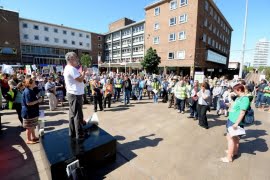 We end our report with a verbatim transcription of the speech given by Socialist Appeal supporter Darrall Cozens, who addressed the strike rally in Coventry as President of Coventry TUC, where 500 public sector workers and supporters rallied in the city centre.
We end our report with a verbatim transcription of the speech given by Socialist Appeal supporter Darrall Cozens, who addressed the strike rally in Coventry as President of Coventry TUC, where 500 public sector workers and supporters rallied in the city centre.
“Sisters and Brothers,
This is a marvellous day. Even the Gods have smiled on us with this brilliant sunshine.
Today, up and down the country, workers have made the tremendous sacrifice of a day’s pay to protest against the policies of austerity which have meant cuts to essential public services, jobs, pay, pensions and terms and conditions.
Workers are out on strike to defend essential public services used by all workers who can’t afford to use private ones, to defend gains of the past in terms of wages, T&Cs, pensions, jobs, and to defend local government services.
That, however, is the end of the good news.
For the cuts so far are only the tip of the iceberg. Some 60% of the cuts are still to come in the lifetime of the next parliament.
Working class people, the poor, low paid, old, children, sick, are being made to suffer to pay for a crisis they did not cause.
Today, with this strike, we are saying we will not pay the price through cuts to our living standards, to our services.
For while we suffer, those at the top of society get even richer. That is the logic of capitalism, a system in crisis.
A system that can only survive by amassing greater wealth at the top and this can only be done by cutting wages, jobs and services at the bottom and by privatising what is left to fill the coffers of the already rich with public money.
In 2013 alone the net worth of the top 1% rose to a massive £518bn, a rise of 13% in one year. That wealth at the top 1% is equal to the wealth of the bottom 55% of the population.
It gets worse. Oxfam has shown that the five richest families in Britain have the same wealth as the bottom 20% or 12.6m people.
The Head of Barclays, Anthony Jenkins, gets £18k per week “allowance” on top of salary to side step the EU cap on pay and bonuses. And at the bottom we have working class people suffering a drop in real income of between 15 and 20%.
TUC figures came out yesterday – public sector workers are £2,245 per year worse off due to austerity.
1.4m people, mainly young workers, are on zero-hour contracts. 250k at least are paid less than the minimum wage. AND THEY TELL US WE ARE ALL IN IT TOGETHER!!
Save the Children has said that on current trends some 5m children will be in poverty by 2020. Eviction threats are at a ten year high due to benefit changes. NHS waiting lists are over 3m for the first time in 6 years. That is the paradox of the crisis. If you are already rich, you are bribed with even more wealth to try and resolve the crisis. If you are poor, your living standards are cut even further.
Locally in Coventry the cuts mean that by 2017, in three years time, council spending will be 50% of the 2010 level. Another 1,000 job losses are being demanded and more will have to go to balance the books.
And the leader of city council tells council workers that Coventry citizens are only interested in filling pot holes and emptying bins and are therefore, by implication, NOT interested in children’s services, in adult and social care, or education, or any other services provided AT THE MOMENT by the council.
But this is not only local but also a national and international phenomenon.
Capitalism is demanding cuts in the share of wealth that goes to working class people in order to save the system and the cuts are being carried out by Tories and Labour politicians alike all over the world.
Therefore those who say that the cuts are “ideological”, thereby implying that with another ideology the cuts will not take place, are utterly wrong.
If you decide to solve the crisis on the basis of maintaining capitalism, you use the methods of capitalism. The market dictates to you, not the other way around.
We have been warned. Osborne did it in his march budget. Austerity will continue for another 20 years, at least, and then public spending on services and jobs will be at the level of 1948 – and will stay at that level as that is all that the system can afford.
The oecd prediction last week is worse. Capitalism in the developed world will go through at least 4 decades of stagnation with rising inequalities of wealth.
That is why we in the labour and trade union movement MUST have a two-fold strategy.
Firstly, today is a warning to the government that we will not put up with the cuts. Today tells us that we are not alone, that we have the potential strength to stop this government. Today will give us confidence that we can do something, a confidence that we can build on.
The next stage, however, must be a ONE-DAY General Strike, that unites all workers across all sectors of the economy, because all workers as service providers or service users are suffering from cuts.
Secondly, we must have a political programme that puts an end to a diseased system that imposes cuts on the working class in order to survive.
Unite the Union has shown the way over the past two years. It has called for public ownership of banking and finance, of railways, of utilities and of energy companies.
In the Coventry Trades Union Council we would also add that the other major monopolies that dominate the economy should also be publicly owned and run under workers’ control and management.
When we work together industrially to stop the cuts and politically to create a new society, a socialist society, we will decide democratically how social wealth is spent – schools, hospitals, jobs, pensions, a shorter working week.
Comrades! Back in May IMF leader Christine Lagarde and Mark Carney of the Bank of England said that capitalism is doomed if ethics vanish, if people see bankers getting huge bonuses while living standards for most fall. Capitalism, however, has only one ethic – profit – and they will act on that ethic no matter what it costs. There is a storm brewing. Social and political unrest is on the order of the day. People are getting angry. The London Metropolitan Police have bought three water cannons to use on the streets of the capital. So far these have only been used in the six counties – now they will be used on the mainland of Britain. And the government too is talking of banning strikes in the public sector.
They kick you, wring the life out of you and then tie you up in knots to stop you fighting back. Only the labour and trade union movement can put a stop to this.
The future is ours if we grasp it with both hands and have the confidence to fight.
That is our task.”





